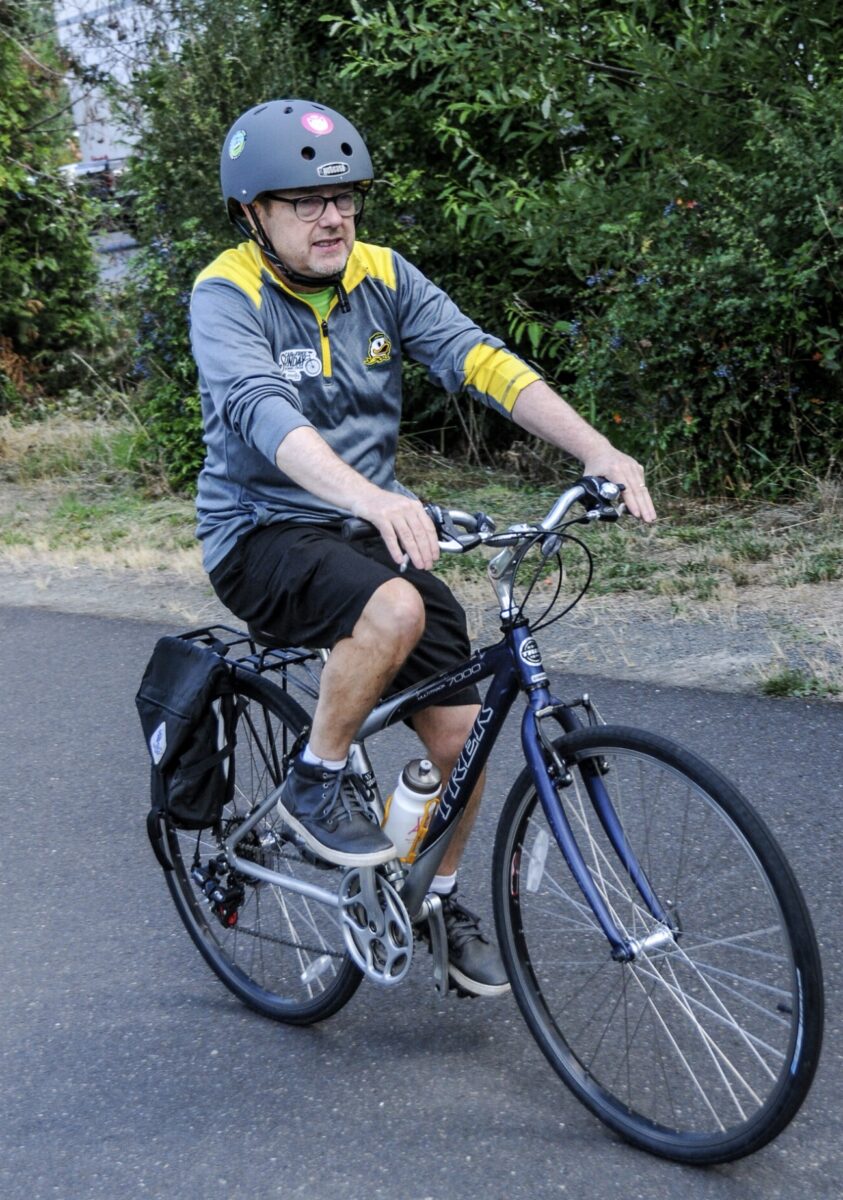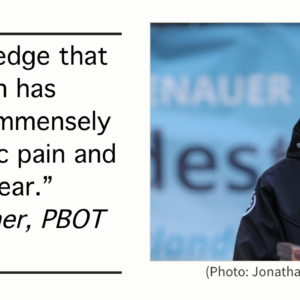Chris Warner has left his post as the director of the Portland Bureau of Transportation, a position he has held since May 2019. Warner has taken a job with new Oregon Governor Tina Kotek and will serve as her deputy chief of staff of public administration. In an email to PBOT staff this morning newly named PBOT Commissioner Mingus Mapps said this was “an unexpected transition” but that he’s “thrilled” for Warner’s new role.
In her announcement, Gov. Kotek said Warner will, “coordinate activities and oversee the new office’s efforts to better align the Governor’s office management and oversight of agencies and the policies they manage.”
Warner was named PBOT director in May 2019 and was interim director for about one year prior to that. This change isn’t all that surprising given that PBOT has a new commissioner-in-charge (Mingus Mapps) and because the City of Portland is just two years away from a massive overhaul of its form of government that is likely to bring sweeping changes to how bureaus are run.
Salem political circles will be familiar territory for Warner. His wife, Barbara Smith Warner served as an Oregon State Representative (for district 45) from 2014 to 2022. Prior to his job at PBOT, Chris Warner was a policy advisory for Governor Ted Kulongoski, U.S. Senator Ron Wyden, U.S. Representative Peter DeFazio, and most recently he was chief of staff for former Portland City Commissioner Steve Novick.
PBOT Deputy Director Tara Wasiak will step into an interim role while a national search is conducted for Warner’s replacement. Wasiak was in charge of PBOT’s Maintenance Operations group before she became deputy director.
It’s unclear whether the City of Portland will launch an immediate search for a new PBOT director given the lame duck status of our current government. The fact that we’re less than two years away from implementing the changes brought on by charter reform, we might see an extended run from Wasiak while the dust settles at City Hall.
Warner’s tenure as PBOT leader was defined by the racial justice protests and the COVID-19 pandemic. Warner once said equity was PBOT’s “north star” and in June 2020 in the heat of protest and outcry over the killing of George Floyd in Minnesota, he vowed to make the agency more inclusive and “anti-racist.” That commitment led to PBOT staff trainings, a re-evaluation of all policies, a plan to “assess and address infrastructure priorities with Black-serving organizations, and other promises.
When Warner had the opportunity to influence a project on the commercial section of SE Hawthorne Boulevard in May 2021, he surprised many Portlanders by pushing through a design option that favored wider driving lanes and crossing improvements instead of bike lanes. Warner and PBOT (in a decision set in motion by former City Commissioner Chloe Eudaly) claimed the addition of bike lanes would be bad for climate change and racial equity because it would slow down bus service and require more driving trips from Black and other people of color who live in east Portland. That decision was “disappointing” to PBOT’s own Bicycle Advisory Committee, was called a “huge missed opportunity” by a notable member of the Portland Planning Commission, and was part of the rationale for a pending lawsuit against the City of Portland that alleges they have not complied with a state law that requires bicycle lanes on major road projects.
The rate of bicycle ridership in Portland continued to stagnate and fall during Warner’s tenure at PBOT, while the number of cars and drivers on our roads has increased. In March 2021 the Portland Planning Commission wrote a letter to Warner outlining their concerns that PBOT wasn’t doing enough to boost bicycling and limit car use. As more drivers have hit the roads and PBOT has failed to bolster enforcement capabilities, the number of fatal collisions is at all-time highs and the perception of safety on our streets is at all-time lows.
In February 2021 Warner dissolved the city’s Vision Zero Task Force and promised a new multi-pronged engagement plan that would include a “BIPOC-centered education and outreach” strategy, collaboration with Metro and Multnomah County, an outreach and marketing plan for automated enforcement, and a new informational dashboard to help inform the public on progress. The dashboard was released two months later.
In May 2021, former PBOT Commissioner Jo Ann Hardesty shocked PBOT Bicycle Advisory Committee members when she revealed at a monthly meeting that she wasn’t aware of the Bicycle Plan for 2030 and that no one in PBOT leadership had briefed her on it.
Warner’s most significant legacy might be the development of the Healthy Business program, which awards permits to businesses to use more street space and public-right-of-way for outdoor dining. That program emerged in May 2020 as an emergency measure to keep businesses afloat when COVID-19 health restrictions prevented indoor dining and it grew to include street plazas as well. PBOT has since made it a permanent policy and it will lead to more carfree spaces citywide.
UPDATE, 12:43 pm: Here’s the announcement from Commissioner Mapps sent to all PBOT staff this morning via email (it also appears to be his first communication with them since taking over the bureau):
Greetings, Portland Bureau of Transportation staff; my name is Mingus Mapps, as you have likely heard I am the new Commissioner-in-Charge of PBOT. I am honored to serve with you and continue the great work that PBOT has been doing. As PBOT Commissioner, I look forward to improving livability throughout the city, increasing the safety and accessibility of our transportation system, and furthering climate change initiatives while addressing the bureau’s structural budget challenges.
With the shift towards building a Public Works department with Environmental Services and Water, there are new opportunities to elevate the innovative efforts from the three bureaus in the areas of procurement, asset and data management, equity and more. We can do big things together and by working in concert with our regional partners this year.
Last night, Governor Kotek announced that she will be appointing Director Chris Warner to her administration as Deputy Chief of Staff of Public Administration. It’s fantastic news for the future of state service delivery to have such an experienced leader in this new role.
This is certainly an unexpected transition and I am sad to see Director Warner leave PBOT and the City of Portland, but at the same time I am thrilled that he will be joining Governor Kotek’s team. In the immediate term, I am appointing PBOT’s deputy director Tara Wasiak as the interim director while we conduct a competitive process to select a permanent director this year. I and PBOT leadership are committed to a smooth transition and ensuring a stable environment for employees.
One of my regular practices as Commissioner-in-Charge is to host employee town halls so that I can engage with bureau staff directly. My kickoff town hall is not yet scheduled, but when it is you will be the first to know. I hope to meet many of you there.
Thank you for your service to our community. I look forward to working with you!
Commissioner Mapps










Thanks for reading.
BikePortland has served this community with independent community journalism since 2005. We rely on subscriptions from readers like you to survive. Your financial support is vital in keeping this valuable resource alive and well.
Please subscribe today to strengthen and expand our work.
He never seemed ‘comfortable’ with his role that I think so many folks at PBOT tend to be when chatting with him. In transportation circles, he glided over the nitty-gritty and didn’t really have a level of passion that is typical with other PBOT staff he was surrounded with. He stood out at those times. He was an administrator, not a wonk.
He also never striked me as a person who strived under stressful or tense discussions with folks. His role as director under Eudaly/Hardesty seemed really beneficial for him as it allowed these more politically-prevalent commissioners to be the point of contact and ‘take the heat’ on critical PBOT decisions. Under that cover, he seemed to keep his head down and work on the day-to-day that never really coalesced to leading PBOT in a growing and exciting way.
At election night with him in November he seemed stressed to see that charter reform was going to pass. My quick guess into why is that with no PBOT Commissioner starting in 2025: there will be no one but the PBOT Director to take the heat.
Overall, I still hope he finds success with Governor Kotek, because I don’t believe he found it as PBOT director.
All this being said, I’m excited for the opportunity for a new energy in PBOT leadership. Someone who sees the streets not behind their dash, but on their bike, the bus, or the max, and is willing to lead into some hard changes to reach our mode share goals.
and my god: have a PBOT Director that is willing to implement POEM!!!
Claiming to have omniscient knowledge of Warner’s feelings and motivations seems unnecessary when there are so many concrete failures to criticize. For example: the reluctance of PBOT to build bike lanes protected by anything other than a few flimsy flex-posts, PBOT’s refusal to use strong traffic calming to reduce car traffic on bike facilities, and PBOT’s perennial failure to maintain bike lanes.
Hi Mauri. Find a way to say that comment in a different way and I’ll be happy to publish it. I’m fine with criticism, but you’ve got to be a bit better at it. Thanks. — Jonathan
It’s probably too much to say that Warner was anti bike, but it was clearly un bike. Let’s hope the interim director, who may be there for a while, reprioritizes active transportation and does a better job for us.
One common theme of those opposing charter reform is that it would involve several years of “lost time” as government became introspective. I hope this is not beginning of a years-long leadership vacuum and a delay of the forward movement we so terribly need.
Sorry! It was not my intent to to misgender Warner by calling him “it”.
This does not seem like good news to me. From my perspective, PBOT has gotten significantly less effective in all areas and the last3-4 years: planning is worse (look ant the North Portland in Motion that excludes Swan Island and all of the recreational and industrial destination at the north end), Design: 7th/Tillamook and Greeley for example- there are dozens of others), construction (See the puddles and sharp transition bumps along Better Naito and along Front), maintenance (The street lights along Better Naito at the Steel Bridge have been out for months- there are a million more examples of this), plus project schedules, detours, parking enforcement, MUP maintenance… it all seems to be significantly worse than it was in a way that I feel reflects very poor leadership. This move does not bode well for Kotek’s administration.
Warner’s career path seems like that of a high-level administrator – a “chief of staff,” whose job is to manage the boss even more than to manage people, projects, etc. Maybe that’s why he seemed to take no joy in the million little tangible details of running transpo infrastructure in Portland. We need someone like that – someone who looks at a swept bike lane and weeps with joy.
It seemed he did more harm than good at pbot so glad to have him out. Wherever he goes, as long as it’s not anywhere near local bike infrastructure decisions, I’m happy
Warner did nothing but “roll along” with Hardesty’s missteps: PBL’s on Hawthorne are “racist”, instituted inane programs like plastic traffic barrels and plastic sticks to combat gun violence, the suspension of reasonable enforcement of parking laws under Eudaly and Hardesty and lack of support for traffic enforcement throughout the city. The decline of livability and safety in Portland has been rapid and severe. PBOT and Warner were part of this. Unfortunately, I don’t expect anything of substance from him with Kotek’s administration.
Seems like Warner’s legacy is a big zero – and not the zero in Vision Zero, unfortunately. I’m not saying he didn’t make some good things happen, but he also allowed a lot of bad things to happen. A negative plus a positive gives you zero – we haven’t made progress, and the numbers reflect it.
One a side note: Warner looks really awkward in his obligatory cycling photo, causing me to think he wasn’t really comfortable on a bike and therefore didn’t think it’s a serious mode of transportation. But I’d be happy for someone to tell me I’m wrong about that. At least he’s riding a bike, unlike JoAnn who just stood over her bike – though she looked very good doing it.
People on BP are acting all surprised & disappointed in Chris Warner’s tenure leading PBOT. When you’re a career political operative it’s almost guaranteed that you don’t know how to be an effective transportation agency administrator. Maybe PBOT should be led by an experienced engineer or planner who knows how to navigate the political world rather than choosing a politician to lead PBOT.
In my experience, “experienced engineer who knows how to navigate the political world” is an oxymoron. Planners maybe, but not engineers, and certainly not the BikePortland political world.
Those experienced engineers and planners who know how to navigate the political world exist. They’re in leadership in professional organizations such as Women’s Transportation Seminar (WTS) and the Institute of Transportation Engineers (ITE).
I agree with you, Fuzzy. We need a professional leading PBOT who is in touch with the streets and can inspire the people working on the streets. A career politician like Warner doesn’t give you that. I’m excited for PBOT to be led by someone who is much more in touch and much more down-to-earth. Leave the politics to the City Council and do a *great* job with the day-to-day stuff. Brag about how well you maintained the bike infrastructure, since the car/truck infrastructure pretty much takes care of itself.
In thinking about this further, I think the Blumenauer Bridge is reason enough for Warner to be fired from PBOT and never be on the public payroll in Oregon again: The bridge cost MILLIONS and was late- nothing too surprising there. Despite this being a brand new bridge, there not a straight/direct bike connection on the north- it is a mess of hard right turns following a painted path across a sidewalk and between curbs- it is worse than many retrofits and it is inexcusably bad design. Worse than that, though is that PBOT sat on its hands and did NOTHING to create a route along 7th. They didn’t even flip the stop sign at 7th/Davis. At the bare minimum, 7th should gotten the greenway treatment from the bridge to Washington with some crossing enhancement at Stark, but they did absolutely nothing. This was large budget item for PBOT and should be seen as a massive stain on Warner’s resume
It’s a bit funny to read about your disappointment in bike infra on the east side. It’s like you were given a giant birthday cake and now you’re disappointed you didn’t get enough frosting. Other parts of the city have no bike/ped infra at all.
Fred, I think are missing the point that I am trying to make. For no additional money, the infrastructure could be designed and built well, but PBOT is not planning, designing or managing construction well. To revise your analogy: It’s like someone made giant birthday cake but left out the sugar and only baked it for half the time- most of the ingredients are there, but is not really a nice gesture. I guess it is nice to spend the time and effort gather the materials and work on the cake, but a birthday cake (or a bike bridge) is not really “it’s the thought that counts” kind of a thing.
Yes, PBOT is pouring resources into certain parts of town, but those resources are being squandered.
I love frosting. You won’t mind it I help myself to a bit of yours, will you?
While perhaps minor in the great scheme of things compared to other transportation safety issues, don’t forget how PBOT under Chris Warner (and Chloe Eudaly) implemented the e-scooter program with utter disregard for public safety.
PBOT rules about riding on -and parked so as to obstruct sidewalks and ADA ramps- were routinely ignored, and PBOT enforcement personnel were never directed to enforce it. This practice was a threat to pedestrians, especially seniors like me and persons with physical and/or visual disabilities. Based on numerous conversations I had with PBOT Parking Enforcement officers, PBOT did not give them direction or authority to enforce PBOT’s scooter rules if they were to encounter, for example, a blocked sidewalk or ADA ramp in the normal course of their duties.This is also despite City Code section 17.44.010 A: “It is unlawful for any person to obstruct or cause to be obstructed any roadway, curb or sidewalk by leaving or placing, any object, material or article which may prevent free passage over any part of such street or sidewalk area …”The penalties for bicycles which obstruct sidewalks/ADA ramps (something I rarely if ever have seen) is more significant than those for scooters. Bicycles can be impounded under City Code 16.70.330 which in part reads: “A. A bicycle left on a street or other public property for more than 72 hours may be impounded. B. A bicycle may be immediately impounded if:It is parked in violation of this code and obstructs or impedes pedestrian or vehicular traffic; It is an immediate threat to the public welfare.”When I inquired as to why scooters were not added to the code. PBOT advised me that that was because bicycles were generally owned by individuals, while scooters were owned by corporations; my response at the time to this absurd rationale was that PBOT was admitting that it cared more about the interests of big out of town, Silicon Valley scooter corporations with an army of lobbyists rather than those of individual Portlanders who pay taxes and live here.PBOT- including Chris Warner specifically- ignored numerous complaints about PBOT rule violations that were brought to their attention, especially those involving riding on and/or obstructing sidewalks. In fact, in the 2nd year or so of the scooter program, PBOT announced that Portlanders would have to file complaints with the companies themselves- who of course had no financial interest in penalizing their customers. This is akin to requiring someone concerned about e.g. the safety of a particular vehicle, to contact Ford or GM rather than the appropriate regulatory agency. And as we recently read about with respect to the hit-and-run involving a ride share vehicle, PBOT has apparently agreed with both scooter companies and ride share companies to not only transfer financial risk to the renter and anyone or anything they might hit, but also allows the companies to have a very difficult process to identify the customer involved with an accident.As noted at the beginning, this issue pales in comparison to other transportation safety issues. However, when we read about PBOT footdragging to correct known safety issues like those at Southeast 26th Avenue and Powell Boulevard (where recently Sarah Pliner was tragically killed) and West Burnside and 22nd (where also tragically a pedestrian was recently struck and killed, and where PBOT is planning to fix- in 2024!), it’s clear that when taken all together public safety has taken a back seat at PBOT.
Perhaps a new director will set a new direction- starting by putting public safety first- for pedestrians, bicyclists, and drivers of motor vehicles.
You make some good points here, Bob, but just remember that career politicians are secretly enamored of DISRUPTION. All of those scooters were supposed to disrupt our lives in important ways – which they did, of course.
Even to the extent that Warner and Hardesty disbanded the Vision Zero Task Force even as the traffic fatality rate dramatically worsened.
Are you referring to the collision on the Sellwood bridge a few days ago? If so, that couldn’t have been a BIKETOWN bike because their range doesn’t extend that far – check the map on the website. I think it was a personal e-bike.
Overall though, I agree with you that PBOT needs to take a more active role in managing the scooters. I think they are a good solution for the so-called ‘last mile’ and can be a great way to introduce people to non-car mobility. Unfortunately, most people’s encounters with them are overwhelmingly negative. Scooters littering the sidewalk are pretty annoying, and I have yet to see anyone ride a rental scooter “the right way”. As in, moving with the flow of traffic, following traffic signals, etc. Not sure what the solution is there.
Thanks for your comment. First, the collisions I was referring to involved a bicyclist (Sarah Pliner) at SE 26th and Powell, and the more recent pedestrian killed on West Burnside at 22nd..
Second, I don’t think in Portland e-scooters would ever serve the “last mile” since that theory implied mass transit users would use them for the last mile to their destination; that would seem to require staging of scooters at many transit stops- something that never happened in Portland and probably never would/will. The solution at this point, in my opinion, is to admit the scooter experiment failed here, and terminate the permits.
Finally, as I noted the safety problems with that program pale in comparison to larger issues that are killing people with regularity. I think, however, the failure to address public safety issues relative to the scooter program was simply emblematic of a larger problem at PBOT: making public safety the absolute top priority and expeditiously addressing known hazards- like 26th/Powell and Burnside/22nd. They may be finally addressing the 26th/Powell issue at long last, but apparently will not fix the Burnside/22nd problem until 2024. Absurd!
Thank god he’s gone he was the absolute worst. Deaths on our roads skyrocketed while cycling plummeted under his leadership. Plus his whole bike lanes and slowing down cars is not equitable stance was such a backwards position even if well meaning